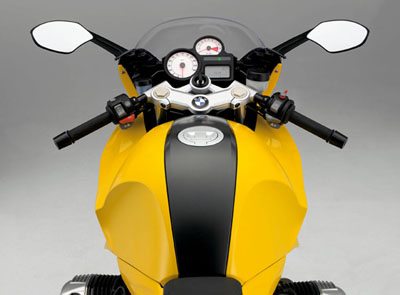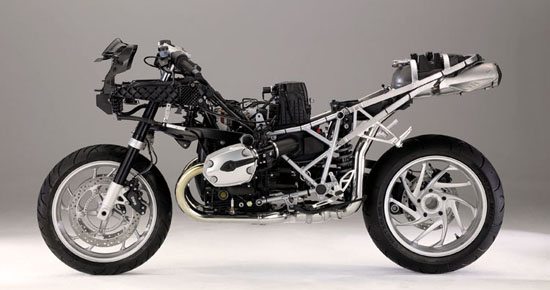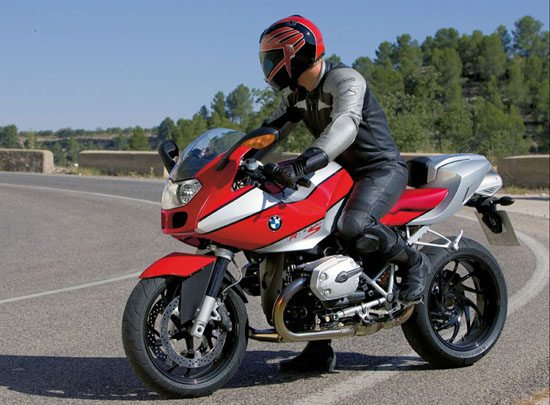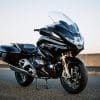BMW Announces the New R 1200 S
The following information is an English translation of the German press kit and some information and specifications may not apply to the U.S. models.
Further information and dates of expected U.S. availability will be provided at a later date. Text and photos courtesy of BMW AG.
Concept and Features
Introducing the new R 1200 S — BMW Motorcycles is proudly presenting the most powerful production Boxer the world has ever seen – a machine standing out clearly from all other models in the range.
This new addition to the Boxer series is following 
This expression of superior performance and sporting power is borne out from the start by the athletic looks of the R 1200 S: From the front fairing with
the “kidney” grille so typical of BMW and the asymmetric dual headlights all the way to the unmistakable silencer at the rear and the LED tail lights, each and every line and feature of this new model simply exudes power and dynamism all the way.
BMW Motorcycles quite intentionally chose the former model as the benchmark in creating the design of the new R 1200 S.
And together with this distinctive legacy, the responsible designers were able to successfully bring out a particular touch of lightness and dynamism in the looks of the new machine – not least thanks to its more slender and perhaps even more athletic silhouette bearing clear testimony to the outstanding lightweight technology of the R 1200 S.
Overall weight of the new machine in road trim but without fuel is a mere 195 kg or 430 lb, making it 13 kg or almost 29 lb lighter than its 1,100-cc predecessor. And with the tank full, overall weight of BMW’s new Sports Boxer is an equally impressive 213 kg or 470 lb.
Modified in numerous important features, the 1,170-cc engine offers enormous power reserves reaching a peak of 90 kW/122 hp at 8,250 rpm.
These figures alone underline the sporting standard of the new model, which nevertheless does not seek to be a super-sports. Rather, one of the most important objectives in developing the new R 1200 S was to achieve
a perfect synthesis of sportiness and everyday riding qualities enabling the rider to take on a relaxed seating position for effortless riding enjoyment even on long distances.
And thanks to its slender waist – a result of the seat configuration optimized around the rider’s legs – the R 1200 S also provides safe and secure ground contact when at a standstill.
It almost goes without saying that BMW’s new Boxer comes with all the features so typical of the brand, such as a fully controlled catalytic converter, the single-wire system for the on-board network complete with an electronic immobiliser, a smooth and easy-shifting six-speed gearbox, maintenance-free shaft drive with a single swinging arm, as well as Telelever front wheel suspension.
The specific set-up of the suspension and running gear ensures extremely precise and smooth handling at all times further enhanced by the high-performance brake system: Optional BMW Motorrad ABS anti-lock brakes combine low weight and fast response simply perfect for the sports rider – in this case without the integral function but with on-demand operation allowing the rider to deactivate ABS on the race track.
The wide range of BMW options and accessories also reflects the customer’s wishes and special requests. The enthusiast seeking to highlight the looks of his machine as a sporting performer, for example, while at the same time enjoying each and every bend in the road, has – to mention just two examples – the choice of an extra-wide rear wheel as well as the high-performance Öhlins sports suspension with spring struts variable in length.
The most sporting and dynamic Boxer of all times is ready to go!
Boxer Engine Has More Power
BMW’s new Sports Boxer benefits from the innovations already featured on the R 1200 GS: Displacing 1,170 cc, the two-cylinder features four valves and two spark plugs per cylinder, thus following the basic principle of the flat-twin power unit of the GS model. But at the same time far-reaching modifications ensure much higher peak output than on the RT and ST models.
Particularly the modified cylinder heads enable the R 1200 S to develop an impressive 90 kW/122 hp smoothly delivered to the crankshaft running in anti-friction bearings. Power is transmitted via new, high load-resistant connecting rods made of extra-strong steel alloy.
The camshafts with modified control timing and larger valve lift rotate no longer in two, but rather in three bearings serving to further enhance the stiffness and precision of the entire valve drive system. Harder valve springs and reinforced rocker arms take the high speed of the engine of up to 8,800 rpm into account, a speed level incidentally never seen before on a BMW Boxer.
New pistons are also one of the significant changes made on the S power unit, increasing the geometric compression ratio to 12.5 : 1 and thus marking a new record for an air- and oil-cooled power unit.
This enormous compression ratio serves in particular to boost torque at low and medium engine speeds, the flat-twin developing maximum torque of 112 Newton-metres or almost 83 lb-ft at 6,800 rpm, despite the emphasis on supreme peak power.
On the road, this means supreme engine response and muscle at all times, the flat-twin developing its maximum output on premium plus (RON 98) fuel. And at the same time the engine is also able to run smoothly on 95-octane premium thanks to its anti-knock sensors, with only a minor reduction of power.
Throttle butterflies and intake manifolds enlarged in diameter by 5 millimeters or 0.20´´ to 52 millimeters or 2.05´´ and interacting with the modified intake funnel to boost the cylinder charge also serve to increase engine output. Due to the large intake cross-sections, the throttle butterfly housings feature special, progressively-acting kinematic control, the rider’s commands in calling up engine power being delivered to the throttle butterflies not on a linear curve, but rather with a variable transmission ratio.
This sophisticated and well-conceived system ensures a harmonious flow of power together with superior muscle and pulling force immediately when the rider turns the gas handle to full load at low engine speeds.
It goes without saying that the machine’s electronic intake manifold injection, together with the engine management and exhaust manifolds, is specially tailored to these modified flow conditions, the interior diameter of the exhaust gas manifolds being increased by 5 millimeters or almost 0.20´´ to 50 millimeters or 1.97´´ on the new R 1200 S.
Despite its sporting character, the high-performance flat-twin power unit offers the same running smoothness as the existing models in the R 1200 Series – a particular feature attributable, not least, to the balance shaft.
The dog-shift six-speed gearbox weighing just 13 kilos or not quite 29 lb as well as lightweight shaft drive have already proven their qualities on the new Boxer generation and are now being carried over without requiring any modifications to the R 1200 S.
Refined Frame
Another proven concept is the multi-dimensional frame structure on the R models integrating the engine into the chassis and suspension as a load-bearing element: The R 1200 S features a three-piece frame specially geared to the qualities and characteristics of this sports motorcycle.
The central and front sections of the tubular frame structure are made of steel, while the rear frame bolted in place is made up of extra-light square aluminum tubes. The advantages of this structure are not only low weight,
but also simple and low-cost repair of accident damage at the rear.
The passenger footrest supports also bolted on to the frame come off easily within just a few moments, for example for riding the R 1200 S on a race track.
Stable Telelever With Steep Steering Head Angle
Steering precision is a particularly important requirement on a sports motorcycle. But apart from an absolutely precise response to his steering commands, the rider also expects clear feedback from the front wheel.
This is precisely why the Telelever front wheel suspension on the R 1200 S comes with fixed tubes measuring 41 millimeters or 1.61´´ in diameter and wheel travel of 110 millimeters or 4.33´´. Featuring longitudinal arms supported on a specially matched spring strut, the Telelever does not require any maintenance and reduces brake dive to a minimum.
The geometry of the suspension is new and has been specifically tailored to the R 1200 S, even the basic data and configuration figures clearly highlighting the agility and superior handling offered by this Sports Boxer on winding roads, naturally in conjunction with low weight in road trim with a full tank of just 213 kg or 470 lb: Measuring 66°, the steering head angle is 1° steeper than on the former model, while front wheel castor is now just 87 millimeters or 3.43´´, instead of the former 100 millimeters or 3.94´´.
As a result, the rider will hardly even notice that wheelbase is up from 1,478 to 1,487 millimeters (58.19 to 58.54´´). What the sports rider will however notice and appreciate immediately is that the R 1200 S allows him to lean over at an angle 2 per cent lower in bends than on the former model, enabling the rider to reach an extreme position of up to 52°.
Paralever
The big advantages of the BMW Motorrad Paralever are well known and widely acknowledged: Benefiting from its lifetime oil filling in the axle drive, the lightweight driveshaft with single-arm wheel guidance requires absolutely
no maintenance and is hardly any heavier than a conventional swinging arm with chain drive.
Made of cast aluminum, the entire structure rests on the frame of the motorcycle via a modern gas-pressure spring strut with travel-dependent damping (TDD) and offers 120 millimeters or 4.72´´ spring travel.
Travel-dependent damping operates as a progressive system: The further the spring strut moves in, the stronger the counteracting damper forces become. In all, therefore, the system ensures a smooth and sensitive response to minor bumps on the road as well as superior stability on bad or strongly undulating surfaces.
Wheels and Tires
The sweeping, dynamic design of the aluminum wheels has already attracted attention on BMW Motorrad’s sporting and dynamic K-models and is now to be admired for the first time on the Boxer Series. Particularly the stylish rear wheel is a genuine eye-catcher, the high-rising silencer allowing a free, unobstructed view of the wheel.
The R 1200 S is also a genuine sportsman when it comes to wheel dimensions: The 3.50 x 17-inch wheel at the front runs on a 120/70 ZR 17 radial sports tire with particularly good grip, while the 5.50 x 17-inch wheel at the rear features a high-grip radial sports tire measuring 180/55 ZR 17.
And as an option, the R 1200 S is available straight from the factory with a six-inch rear wheel running on a 190-format tire.
ABS Brakes Optional
The new BMW R 1200 S is an uncompromising performer also in its brake technology: The front wheel comes with two brake discs measuring 320 millimeters/12.60´´ in diameter and 4.5 millimeters/0.18´´ in thickness, and held in position when required by two four-piston swing calipers.
This brake system outperforms the brakes even the R 1100 S, which already were quite outstanding with its brake discs measuring 305 millimeters or 12.01´´ in diameter and 5.0 millimeters/almost 0.20´´ across.
The rear wheel, in turn, comes with a double-piston floating caliper acting on a brake disc measuring 265 millimeters or 10.43´´ in diameter.
Benefiting from brakes of this standard, even the sports rider out on a race track can rely on smooth and consistent, precise brake response with operating forces reduced to a minimum. Hydraulic control and superior operation
of the brake pistons is ensured by high-quality, steel-reinforced brake hoses.
Choosing an appropriate ABS anti-lock brake system, the engineers at BMW Motorrad focused from the start on the sports-minded rider: The system used on the R 1200 S is an upgraded two-channel ABS configuration without an integral function or brake servo, excelling through low weight and compact dimensions and thus adding just 1.5 kilos or 3.3 lb to the overall weight of the machine.
This low weight is made possible by a newly designed, extremely compact pressure modulator featuring linear-control intake valves for optimum brake pressure at all times in the usual ABS control range, that is when applying the brakes with the risk of the wheels locking.
This superiority is ensured by very fast and precise control intervals, the new control valves with their infinitely variable cross-section also enhancing the feeling of smoothness for the rider, who will feel only a minor pulse effect in the brake levers. A further advantage for the rider is the option to deactivate ABS when riding on a race track.
BMW Motorrad’s new ABS anti-lock brakes again come with an even wider range of diagnostic functions, the wheel speed sensors, for example, automatically supervising their distance from the sensor wheel and thus contributing to the supreme standard of all-round safety offered by the system.
CAN-Bus On-board Network
It almost goes without saying that BMW’s new Sports Boxer comes with the single-wire system (SWS) on-board electronics already featured on the R 1200 GS. Having already proven its merits a million times over in the automobile, this superior technology offers a wide range of benefits: It reduces the number and length of cables required, uses CAN-bus technology to connect all control units, and in this way facilitates the process of diagnosing all kinds of running conditions.
A further advantage is that the system eliminates the need for conventional melt-down fuses by automatically switching off the component involved in the case of malfunction.
Using data provided by the single-wire system, the rider is able to retrieve and call up lots of information via the Info-flat screen. As an example, the digital display presents the gear currently in mesh, the amount of fuel left in the tank, current oil temperature, the time of day, and the range remaining on the fuel still in the tank. And in presenting all this information with optimum clarity, a photo-cell control unit even takes ambient light conditions into account, automatically adjusting instrument light intensity to current requirements.
Even the aficionado of analogue instruments will be thrilled at first sight by the cockpit, two circular dials with white faces providing clear information on the current speed of the machine and engine revolutions.
An electronic immobiliser is naturally standard on all BMW motorcycles as an appropriate reflection of their high class and quality. So to the start the engine the rider intentionally requires more than a key with the right contours, since the chip integrated in the original BMW key must in all cases first transmit the right code to the annular aerial on the combined steering and ignition lock, thus enabling engine management to clear the engine for the starting process. This technology is currently the safest and most reliable system protecting a vehicle from theft.


Design
Even at very first sight, BMW Motorrad’s new Sports Boxer boasts an even more slender and dynamic figure than its predecessor, while nevertheless taking up the unmistakable design language of the R 1100 S.
The front end of the new machine is dominated by an asymmetric dual headlight featuring reflectors with geometrically optimized free-shaped surfaces carried over from the GS model. High-intensity H7 bulbs ensure bright illumination, and the cover lens made of scratch-proof polycarbonate coating new in its structure and material qualities harmonizes perfectly with the BMW kidney grille further down guiding the air flowing by straight to the engine oil cooler.
The sporting windscreen likewise comes with a scratch-proof surface coating and is fitted in position in the upper section of the fairing by means of spring brackets facilitating, for example, the subsequent assembly of a tinted windscreen available as an option.
A further advantage is that the fastening points are no longer visible from outside, making the entire front section smooth and clean in design, with all features and components fitting together perfectly. And last but certainly not least, the direction indicators integrated in the rear-view mirrors also make an important contribution to this superior style and good looks.
Yet another striking feature is the fairing support made of light pressure-cast magnesium. Finished in Graphite Grey metallic paintwork and fastened in position by aluminum bolts, this important component is an integral feature of the overall design concept and may be admired not only by the rider sitting on the machine, but also by an outside observer.
Featuring a new silencer and exhaust emission outlets placed beneath one another, the rear end of the motorcycle is accentuated particularly in its vertical look. The extra-large, voluminous muffler is positioned below the rear
fairing smoothly and attractively integrating the direction indicators into the overall design.
A further feature boasted right at the top is the new tail light with no less than 18 light-emitting diodes comprising both the reversing and brake lights operating in two different levels of brightness. Compared with a conventional tail light cluster, the light-emitting diodes require only about 10-20 per cent of the usual level of energy, while at the same time offering a much longer service life and significant safety benefits thanks to their even faster response time.
Focusing on technical features, the aerodynamic qualities of BMW Motorrad’s Sports Boxer deserve particular mention, especially after being perfected in the wind tunnel: With sporting performance naturally being one of the main considerations in the development process, greater significance has been given in this case to the lowest possible drag coefficient as opposed to enhanced protection from wind and weather.
But this does not mean that the carefully designed, low-slung windscreen on the R 1200 S does not give the rider efficient protection around his upper body, thus effectively reducing wind forces at high speeds.
The new BMW 1200 S stands out not only through its technical features, but also through superior all-round harmony in design. Indeed, seen from above the distinctive waist of the new model is almost a bit sensual.
BMW offers the R 1200 S in no less than four different colors, each of which gives the machine a particular, individual touch. Paintwork in Night Black non-metallic, for example, focuses your view on the essential and conveys an immediate feeling of sporting elegance, while White Aluminium matt metallic highlights in particular the design language and lines of the R 1200 S. A particularly striking touch is ensured by Yellow non-metallic with a dark, matt-metallic centre stripe stretching from the front end of the machine via the fuel tank all the way to the seat.
And last but certainly not least, an especially outstanding colour is twin-tone paintwork in Red non-metallic/Titanium Silver metallic, creating a new touch time and again from different perspectives and visually integrating the red seat into the overall colour concept of the motorcycle.
Riding Position
A sports motorcycle must allow the rider to lean forward in a dynamic, “fast” position in order to benefit in full from his – or her – preferred style of riding. Indeed, the shift in weight provided in this way generates an optimum load on the front wheel when braking and entering a bend, and keeps the wheel even better on the road when accelerating.
Despite these important considerations, the handlebar remains at exactly the right height to avoid any undue loads or forces acting on the rider’s wrists. Seat height of 830 millimeters or 32.7´´ and the well-conceived arrangement of the rider’s footrests guarantee a comfortable knee angle allowing the rider to keep his knees firmly on the tank.
A further advantage is that the rider will find it easy to reach the ground with his feet, the seat particularly slender at the front keeping the overall distance from one foot to the other on the ground to a mere 1,810 millimeters or 71.26´´.
Note: For informational use only. All material and photographs are Copyright © webWorld International, LLC – 2000-2013. All rights reserved. See the webBikeWorld® Site Info page. NOTE: Product specifications, features and details may change or differ from our descriptions. Always check before purchasing. Read the Terms and Conditions!







